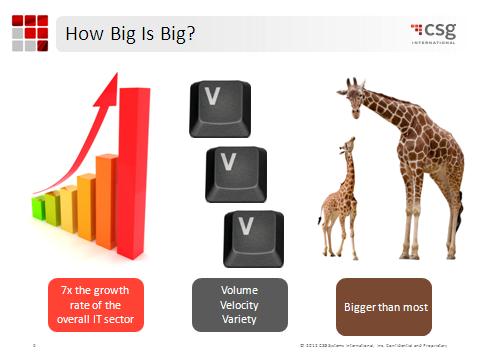The Big Data Opportunity
In reality, most Big Data problems are large in more than one of the dimensions of Volume, Velocity and Variety.
This final citation is perhaps the most useful when it comes to a big data assessment of any part of your business or operations: McKinsey Global Institute, in a mid-2011 feature, described big data as anything that is outside of the operating parameters of the typical data-set. Think about any data-sets or operational processes that are well managed in your business today. Project your data volumes doubling year over year. Forecast its complexity increasing substantially due to additional service information, location data or inter-relationships between users, content or preferences. Imagine processes needed to be executed in half the time. If your vision of this future highlights a point where your systems, your operations or your understanding of customer data hits a limit, then you’ve identified a Big Data scenario.

So really, “big data” is about managing rapidly growing volumes of increasingly complex transactions at accelerating speeds. To set the record straight, there is no specific metric for volume, variety or complexity that determines if data is big. If there is any consistent metric that is applied by multiple analysts, it seems to be that “big data” sets are those that are growing at the rate of 40-60% annually.
How Big are the Benefits?
CSPs can gain insight – beyond network management – from understanding the big data evolution and benefits from other industries.
In the health care industry, Big Data is associated with the growing digitization of medical records, dominated in volume by imagery such as x-rays and other scans that can be easily transported and shared among networks of providers, practitioners, insurance carriers and patients alike. The end result is faster and better-informed decisions about treatment, resulting in better quality health care for the individual and ultimately, healthier results.
In utilities, big data is largely associated with the roll-out of “smart grid” infrastructure that enables detailed meter data – meter readings every 15 seconds will likely become the norm – to be collected for a home or business’s use of gas, water or electricity. Smart grid Big Data provides insight into optimal energy utilization, and enhanced monitoring and control, eventually down to the appliance level.



















